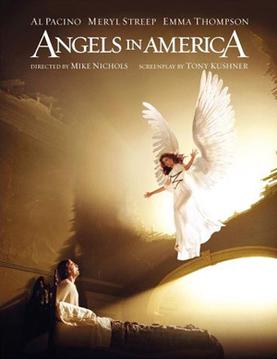
Angels in America (miniseries)
Angels in America is a 2003 American HBO miniseries directed by Mike Nichols and based on the Pulitzer Prize–winning 1991 play of the same name by Tony Kushner. Set in 1985, the film revolves around six New Yorkers whose lives intersect. At its core, it is the fantastical story of Prior Walter, a gay man living with AIDS who is visited by an angel. The film explores a wide variety of themes, including Reagan era politics, the spreading AIDS epidemic, and a rapidly changing social and political climate.[1][2]
Angels in America
Tony Kushner
United States
English
6
- John Bloom
- Antonia Van Drimmelen
352 minutes
- Avenue Pictures
- HBO Films
$60 million
December 7 –
December 14, 2003
HBO broadcast the film in various formats: two three-hour chunks that correspond to Millennium Approaches and Perestroika, further divided into six one-hour "chapters" that roughly correspond to an act or two of each of these plays; the first three chapters ("Bad News", "In Vitro", and "The Messenger") were initially broadcast on December 7, 2003, to international acclaim, with the final three chapters ("Stop Moving!", "Beyond Nelly", and "Heaven, I'm in Heaven") following.
Angels in America was the most-watched made-for-cable film in 2003, and earned much critical acclaim and numerous accolades: at the 56th Primetime Emmy Awards, it became the first of only three programs in Emmy history (along with Schitt's Creek in 2020, and The Crown in 2021) to sweep every major eligible category, and won all four acting categories. It also won in all five eligible categories at the 61st Golden Globe Awards. In 2006, The Seattle Times listed the series among "Best of the filmed AIDS portrayals" on the occasion of the 25th anniversary of AIDS.[3]
Plot[edit]
Millennium Approaches[edit]
It is 1985, Ronald Reagan is in the White House, and AIDS is causing mass death in the Americas. In Manhattan, Prior Walter tells Louis, his lover of four years, that he has AIDS; Louis, unable to handle it, leaves him. As disease and loneliness ravage Prior, guilt invades Louis. Joe Pitt, a Mormon and Republican attorney, is pushed by right-wing fixer Roy Cohn toward a job at the US Department of Justice. Both Pitt and Cohn are in the closet: Pitt out of shame and religious turmoil, Cohn to preserve his power and image. Pitt's wife Harper is strung out on Valium, causing her to hallucinate constantly (sometimes jointly with Prior during his fever dreams) and she longs to escape from her sexless marriage. An angel with ulterior motives commands Prior to become a prophet.
Perestroika[edit]
Prior is helped in his decision by Joe's mother, Hannah, and Belize, a close friend and drag queen. Joe leaves his wife and goes to live with Louis, but the relationship does not work out because of ideological differences. Roy is diagnosed with AIDS early on and, as his life comes to a close, he is haunted by the ghost of Ethel Rosenberg. As the film continues, the lost souls come together to create bonds of love, loss, and loneliness and, in the end, discover forgiveness and overcome abandonment.[4][5]
Reception[edit]
Review aggregator Rotten Tomatoes gave the series a 92% rating based on 24 reviews, with an average rating of 9.5/10. The critical consensus reads "In Angels of America, writer Tony Kushner and director Mike Nichols imaginatively and artistically deliver heavy, vital subject matter, colorfully imparted by a stellar cast."[11] The New York Times wrote that "Mike Nichols's television version is a work of art in itself."[12] According to a Boston Globe review, "director Mike Nichols, and a magnificent cast led by Meryl Streep have pulled a spellbinding and revelatory TV movie out of the Tony- and Pulitzer Prize-winning work" and that he "managed to make "Angels in America" thrive onscreen...".[13]